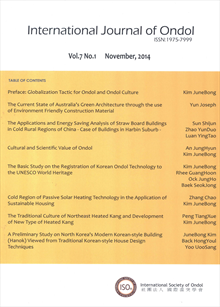간행물
International Journal of Ondol

- 발행기관 국제온돌학회
- 자료유형 학술지
- 간기 연간
- ISSN 1975-7999 (Print)
- 수록기간 2006 ~ 2017
- 주제분류 공학 > 건축공학 공학 분류의 다른 간행물
- 십진분류KDC 547DDC 697
권호리스트/논문검색
Vol.2014 (2014년 10월) 43건
1.
2014.10
구독 인증기관 무료, 개인회원 유료
4,000원
3.
2014.10
구독 인증기관 무료, 개인회원 유료
9,000원
4.
2014.10
구독 인증기관 무료, 개인회원 유료
4,000원
5.
2014.10
구독 인증기관 무료, 개인회원 유료
4,000원
6.
2014.10
구독 인증기관 무료, 개인회원 유료
6,600원
7.
2014.10
구독 인증기관 무료, 개인회원 유료
4,200원
8.
2014.10
구독 인증기관 무료, 개인회원 유료
Straw board is renewable natural building material with the advantages of green environmental protection, strong applicability. But it hadn't been promoted because of many reasons such as technology and economy. Through the analysis ofthe unique advantages and the recent new cases of straw board buildings in Harbin, and the current obstacles to application. The effective ways and the feasible solutions to promote sustainable straw board buildings are summarized.
4,000원
9.
2014.10
구독 인증기관 무료, 개인회원 유료
6,600원
10.
2014.10
구독 인증기관 무료, 개인회원 유료
There are many different types of heating methods in the world. Most of these heating methods are through radiation and convection. These heating types emphasize insulation because it is important to maintain the indoor air temperature. In contrast, the ondol, emphasizes thermal storage in the floor because it heats conduction. In other words it heats through direct contact. This unique heating method has created a unique interior environment. Activities have to occur close to the floor so that people may come in direct contact with the heat, thereby influencing the cultural development of the Korean people. The ondol has also created an interior environment where it is wanner near the floor than the ceiling in contrast to other heating systems where the area close to the ceiling is warmer. This environment is inline with the optimal healthy conditions the Koreans prefer, the warm feet cool head environment.
4,200원
11.
2014.10
구독 인증기관 무료, 개인회원 유료
4,200원
12.
2014.10
구독 인증기관 무료, 개인회원 유료
6,600원
13.
2014.10
구독 인증기관 무료, 개인회원 유료
In recent years, with the development of economy, the proportion of building energy consumption in the national energy consumption is growing. To reduce building energy consumption, has become an important measure to reduce energy consumption, and on the basis of general building sustainability into the design is closely related to residential design. To restrict the problems existing in the cold region residential energy saving construction in our country, the study of cold region in winter heating technology to design, is to summarize a set of suitable heating technology applied in the cold region sustainable residential promotion. The article is divided into five parts, the first part is the introduction, describes the research background, contents, methods, purpose, etc.; The second part mainly introduces the passive solar energy heating technology; The third part mainly introduces the sustainability of residential status and development prospects; The fourth part is how to passive solar heating technology is applied to sustainable residence that is application techniques to explore. The fifth part is through the research, the conclusion and the outlook for the future.
4,600원
14.
2014.10
구독 인증기관 무료, 개인회원 유료
Heated Kangas one of the most important elements of the northeast mral residence, formed a unique 11 mode ofheated brick bed 11 and 11 culture ofheated brick bed 11 in the long history of more than two thousand years. Kang bed-stove has many functions, for example, heating residential, communication, emotion and so on. Not only it is the carrier of the northeast family's material culture, also it plays a major role to spatial organization and building ofthe mral housing. Kang bed-stove is a way of the repeated skillful use of energy. The traditional heated brick bed built with mud and brick. It connects heat able adobe sleeping platform in its outside and links chimney in its inside. The quantity of heat of Kang bed-stove comes from the waste heat of cooking .In recent years, the new mral constmction of northeast is in the stage of development of high-speed. With the progress of technology and the renewal ofthe concept, based on the traditional heated brick bed, people have made some beneficial attempts to change and have introduced some new heated brick bed: Suspended Kang, energy saving kang and so on. All new heated brick beds both retain the traditional heated brick bed's functions, and conform to the requirements of sustainable development planning. new heated brick beds are the combination oftraditional culture and the new technology. This paper ba<;es on rural housing of northeast area as the research object, discusses the connotation, forms and types, heating means of traditional heated brick bed and the evolution of new type of Heated Kang.
4,000원
15.
2014.10
구독 인증기관 무료, 개인회원 유료
This study explores a possibility to expend the scope of Traditional Korean-style ** ** House, or Hanok through including North Korea's Modem Korean-style building. As Korean traditional architecture is gaining more attention, we should think over how contemporary Hanok should be and establish the concept of Hanok for future generations to come. In order to do that, the traditional Hanok design techniques should be understood. Based on this, the appropriate Hanok Design and construction techniques for contemporary buildings could be found out. This study, therefore, aims at finding basic data of design techniques which can be applied to modern Hanok in South Korea and provi%Bng clues for the future Hanok design through studying Korean-style modern buildings in North Korea.
5,400원
16.
2014.10
구독 인증기관 무료, 개인회원 유료
1. 환경과 생태위기
2. 온돌에 숨어있는 환경코드
3. 온돌과 관련된 불의 정신세계
4. 온돌의 원점
5. 스스로를깨끗하게 하는온돌민속
참고문헌
4,000원
17.
2014.10
구독 인증기관 무료, 개인회원 유료
4,000원
18.
2014.10
구독 인증기관 무료, 개인회원 유료
4,800원
19.
2014.10
구독 인증기관 무료, 개인회원 유료
4,000원
20.
2014.10
구독 인증기관 무료, 개인회원 유료
4,000원

